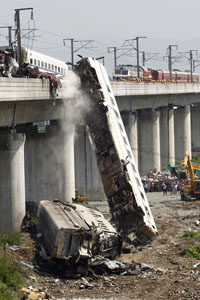New York, August 2, 2011–The suspension of a state television producer for his coverage of last week’s fatal train crash sends a disturbing message to Chinese media outlets, the Committee to Protect Journalists said today.
Information authorities intensified media restrictions at the end of last week in an effort to restrain the unusually probing media treatment of the July 23 disaster. But their initial propaganda directives were widely ignored and the railway ministry’s response to the crash launched a flood of online criticism.
Chinese journalists reported that China Central Television’s “24 Hours” news producer Wang Qinglei was suspended for his July 26 coverage of the crash. The show questioned the cause of the collision, featured footage of the victims in hospitals, and asked whether the country was putting progress before the welfare of the people. It is not clear whether the journalist’s suspension amounted to a permanent dismissal.
“News of Wang Qinglei’s suspension is troubling because so many media outlets defied propaganda restrictions to report on last week’s train crash,” said Bob Dietz, CPJ Asia program coordinator. “Information authorities must realize that a tide has turned in China when so many news outlets join forces to report accurately–this kind of punishment solves nothing and strengthens the mistrust of the government’s handling of emergencies and disasters.”
Internal disciplinary measures against outspoken Chinese journalists generally take place behind closed doors, according to CPJ research, yet several journalists and Internet users publicized Wang’s suspension online. The Southern Group’s Southern People Weekly magazine journalist Yu Nan linked to “24 Hours” and announced Wang’s suspension in his personal Sina microblog account on Friday. The Beijing-based Economic Observer reported the news in its English-language edition online. Images of the journalist circulated as a tribute on social media sites, according to the Hong Kong University-based China Media Project.
All media are affiliated with state institutions in China, but the more commercial outlets have some freedom to challenge propaganda department directives, while others like CCTV and the People’s Daily are traditionally loyal to the Chinese Communist Party’s agenda. Yet the crash seems to have riled even government-backed media outlets. The People’s Daily commentary used unexpectedly strong language, exhorting China to say no to a “blood-smeared GDP” that puts development over safety.
Commenting on his personal microblog on Monday, Wang appeared defiant. “Constantly restricting and blocking is a way to make things appear peaceful on the surface, but it’s actually going to stir up an even bigger crisis,” he wrote.
